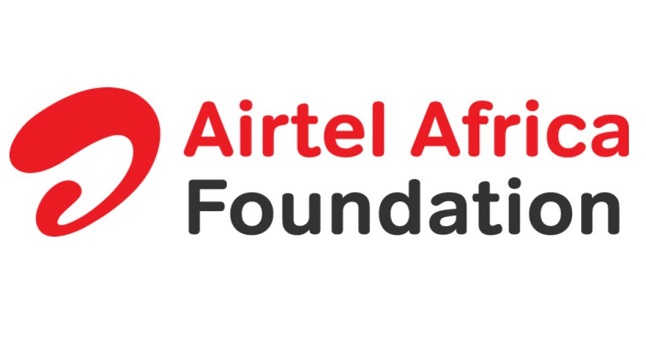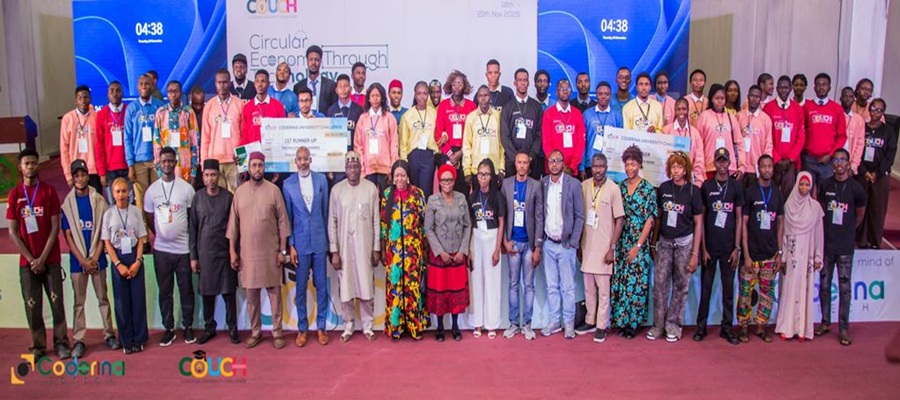Telecom
NCC Invites Input on Proposed Drones Regulation

Nigerian Communications Commission (NCC) has met with stakeholders, including the Office of the National Security Adviser (ONSA) and the Nigerian Civil Aviation Authority (NCAA), to harmonise the proposed regulation and use of drones in Nigeria.

The NCC is considering the use of 2.4 GHz and 5.8GHz spectrum bands for the deployment of drones services in Nigeria to address security and disaster management.
In line with the theme: “Regulation on the Use of Drones,” stakeholders agreed that the Unmanned Aircraft Vehicle (UAV) technology otherwise known as the drone has gone through massive development in recent years, and the market for it shows exponential growth, similar to all other significant new technologies.
Austine Nwaulune, director, Spectrum Administration at NCC, said drones have found application in several areas that are contributing to the development of nations, which include security surveillance, shipping and delivery, disaster management, rescue operations, and healthcare, archaeological surveys, geographic mapping, law enforcement, safety inspection, agriculture, wildlife monitoring, among others.
According to him, “The drone market is scaling rapidly and delivering enriched services in the process. The wealth of new applications of this new technology and the role that stakeholders can play is very critical.
“There are a number of challenges in fully realising the potential for growth that drones bring with them. One of these challenges is meeting the spectrum requirements for drone. Frequency spectrum is used for command and control (ie, sense and avoid) and identification as well as for payload transmissions.
“Currently, the NCC in its effort to optimise usage and benefits of the spectrum, is advancing the administrative standards by establishing technical parameters to use the 2.4GHz and 5.8GHz bands as the frequency for deployment of drones and other emerging technologies.
In his presentation, Nwaulune further said: “Over the years, the Commission has had guidelines on both the use of 2.4 GHz and 5.8 GHz bands for Wireless Access System (WAS). And these are all license-exempt bands (ISM Bands) which studies have shown to be suitable for drone’s deployment globally.
“However, the prevailing guidelines on the use of 2.4 GHz and 5.8 GHz band do not cover the general requirements for the control of drones and payload links such as on-board cameras, sensors.
“Some of these requirements include technical parameters such as transmitting power, coverage distance, and modulation schemes that were not envisaged at the time the existing guidelines were being crafted.”
Prof. Umar Danbatta, executive vice chairman of NCC, in his welcome address, said the country is faced with myriad of challenges such as vandalism of critical national infrastructure, kidnapping, insurgencies, terrorism among others.
Danbatta, who was represented by Adeleke Adewolu, executive commissioner, Stakeholders Management at NCC, said the Commission wished to inform stakeholders of the appropriate spectrum for drones and its conditions of use in order to help in realising the set objectives of deploying them to tackle the security challenges and for commercial services too.
He explained that the guidelines for the use of 2.4GHz and 5.8GHz Spectrum bands had been limited in its condition of use and therefore would require amendments.
“Toward this end, the new draft guidelines have incorporated some changes which include but not limited to duty cycle, transmission, reception frequencies, power, distance, speed and weight.
“We believe these changes will give an added opportunity to the use of drones in the bands without causing interference to the adjacent and incumbent services,” Danbatta said.
He further said the frequencies were currently unlicensed and are not allocated strictly for the utilization of drones in Nigeria.
“The Commission has temporarily identified and modified some conditions in the guidelines and authorised the operators, cleared by the Office of the National Security Adviser (ONSA), to use them in
response to the request from the ONSA to temporarily use the frequencies pending the revision of the guidelines,” Danbatta said.
Telecom
Airtel Africa Foundation Opens Undergraduate Scholarship Portal in Nigeria

The Airtel Africa Foundation has opened applications for its Undergraduate Tech Scholarship in Nigeria, inviting first-year university students with strong academic potential to apply for financial support aimed at accelerating their studies in technology and related fields.

The scheme provides full tuition, accommodation support, and essential study materials for eligible 100-level students. It forms part of the Foundation’s F.E.E.D. agenda, which promotes Financial Empowerment, Education, Environmental Protection, and Digital Inclusion, with a focus on creating pathways for talented young people who face financial barriers.
Airtel Nigeria CEO, Dinesh Balsingh, encouraged students to take advantage of the opportunity. He noted that, “Education is one of the most powerful tools for national development,” adding that “as an organisation, Airtel is determined to build a platform for aspiring young Nigerians to learn, innovate and lead in the country’s expanding technology landscape.”
Applications are open to students pursuing courses such as Information Technology, Computer Science, Software Engineering, Data Science, Cyber Security, Artificial Intelligence, and other ICT-related disciplines at participating universities: University of Lagos, University of Nigeria Nsukka, Ahmadu Bello University, University of Benin, Obafemi Awolowo University, University of Ilorin, and Tai Solarin University of Education.
Dr Segun Ogunsanya, Chairman of the Airtel Africa Foundation, said the scholarship demonstrates the organisation’s commitment to nurturing Africa’s next generation of digital leaders. “Young Africans are brimming with talent and ambition. What many need is a fair chance to pursue their education without financial pressure. This scholarship reflects our belief that investing in their growth will strengthen communities, empower families, and expand the continent’s digital future,” he said.
Applicants must be enrolled in 100-level, have scored at least 230 in JAMB, and hold a minimum of five credits in WAEC, including English and Mathematics, in a single sitting. Required documents include Joint Admissions and Matriculation Board (JAMB) results, university admission letter, West African Examination Council (WAEC) certificate, student identity card, and academic transcript or university results.
The Foundation encourages qualified students across the listed institutions to apply and position themselves for a stronger start in the technology sector. Applications can be submitted at candidate.scholastica.ng/schemes/airtelfellowship2025.
Telecom
YouTube Nigeria Unveils 2025’s Top Lists and Launches New YouTube Recap Feature

YouTube Nigeria on Wednesday released its official 2025 Top Lists, celebrating the nation’s leading music videos and creators, while also unveiling a new personalized feature called YouTube Recap.

YouTube
The lists highlight the explosive growth of Afrobeats, gospel, and Nollywood storytelling, underscoring Nigeria’s rising influence in global entertainment.
According to YouTube, the most-watched music video in Nigeria this year was No Turning Back II by Gaise Baba and Lawrence Oyor, followed by Shallipopi’s Laho and Davido’s With You featuring Omah Lay. Other artists on the Top 10 include Olamide, Asake, Rema, Chella, Wizkid, and Burna Boy.
On the creators’ side, Nollywood channels such as Omoni Oboli TV, Itelediconstudio, and Uchenna Mbunabo TV dominated the rankings, alongside comedy sensation Brain Jotter, who continues to attract millions of viewers with his skits.
Addy Awofisayo, YouTube’s Head of Music for Sub-Saharan Africa, said the lists reflect Nigeria’s “undeniable creative energy” and the global resonance of its artists and storytellers.
“From chart-topping music to must-watch Nollywood dramas, we’re proud that YouTube is the place where this talent can shine,” Awofisayo said.
The newly launched YouTube Recap feature offers users a personalized year-end summary of their viewing habits. It includes highlights such as top-watched channels, favorite topics, and a “Personality Type” card that categorizes viewers into one of 14 personas. It also reveals whether users rank among the top 25 per cent of fans for their favorite creators.
YouTube said the recap is accessible via a banner on the homepage of the app.
The company noted that the initiative aims to give Nigerians a fun and shareable way to celebrate the videos that defined their year
Telecom
COUCH 2025 Grand Finale Highlights Student Breakthroughs, Secures Government Pledge for University Research Commercialization

Coderina Education and Technology Foundation, in partnership with the National Universities Commission (NUC), successfully hosted the Grand Finale of the Coderina University Challenge (COUCH) 2025 at the NUC Auditorium, Abuja.

A cross section of attendees
The event gathered top government officials, university leaders, industry partners, and the ten finalist teams selected from over sixty-two initial entries nationwide.
This year’s challenge, themed “Circular Economy Through Technology” spotlighted the potential of Nigerian university students to develop scalable, tech-enabled solutions that address pressing national issues in sustainability, waste management, energy transition, and the circular economy.
The Grand Finale reaffirmed a consistent message shared across all keynote addresses: Nigeria must accelerate the movement of university research from shelves into practical innovation, commercialization, and industry adoption, a key driver of national development and economic growth.
In his opening address, Mr. Olufemi Niyi, chairman, Coderina Board of Directors, emphasized that university projects must not remain buried in archives.
He highlighted COUCH as a platform proving that research can become functional innovation.
Mr. Niyi called on donors, development partners, and private sector stakeholders to support COUCH as a sustainable national innovation pipeline and encouraged investors to channel resources into skills development and technology innovation among youth.
In his keynote address, Dr. Kingsley Tochukwu, the minister of Innovation, Science and Technology, commended the COUCH programme for its role in moving research “from the shelves to the marketplace,” a key priority under the ministry’s national innovation agenda.
He noted that the initiative exemplifies the type of collaboration and commercialization pipeline needed to unlock Nigeria’s scientific and technological potential.
He highlighted several priority areas critical to advancing the country’s innovation landscape:
“Strengthening Nigeria’s innovation ecosystem through coordinated national frameworks and partnerships; expanding digital innovation pathways to accelerate the adoption of emerging technologies, and building a tech-driven economy that delivers measurable value and global competitiveness”.
The Minister added that “Creating new opportunities for youth innovators, ensuring they are empowered to participate in and drive the innovation economy, are part of the key focus areas of the Ministry
He also expressed the Ministry’s readiness to partner with COUCH, Coderina, and the NUC to incubate and scale these student-led innovations.
Mallam Abdullahi Yusuf Ribadu, the executive secretary of NUC acknowledged the twelve universities nominated for the pilot edition by the commission.
He urged the finalists to use their prize money to advance entrepreneurship and technical skill development, reinforcing the NUC’s commitment to fostering innovation-driven learning across tertiary institutions.
In a remarkable commitment, the Minister donated five million naira to ‘Waste2Light’ from FUT Minna and announced an intention to collaborate with all ten finalist universities to support commercialization.
Dr. Tope Kolade Fasua, special address to the President on Economic Affairs, stated that technology remains the largest driver of global economic growth, stressing that Nigeria’s economic transformation is intertwined with youth innovation.
He commended Coderina and advised for greater visibility and national media outreach; creation of an innovation “museum or archive” for brilliant ideas, and the establishment of centers where theories and research can be turned into products.
He concluded that the future of Nigeria’s economy lies in the hands of today’s young innovators.
Professor Sa’adatu Hassan Liman, special guest at the programme and vice-chancellor, Nasarawa State University, delivering her address on “Sustainable National Transformation,” emphasized the need for stronger industry–university collaborations.
She also emphasized need for entrepreneurial university culture; digital literacy in emerging technologies such as AI, blockchain, IoT; adoption of virtual learning and remote laboratories, and inclusive innovation for underserved communities.
She highlighted AI as a catalyst for reimagining teaching and learning, including teacher retraining and curriculum enhancement.
The competition had two categories of prizes recognizing both technical excellence and public engagement.
Winners of the first category, The Challenge, based on pitch and prototype presentation was Team IMSU – Imo State University , taking home the star prize of ₦5,000,000; 2nd Place winners: Team Neuronaut Nile University Prize, ₦2,500,000, and 3rd Place – Team Waste2light from the Federal University of Technology, Minna: ₦1,500,000.
The People’s Choice Awards winners, based on social media engagement and public voting, are Team ADSU Innovators – Adamawa State Uni.: ₦250,000; 2nd Place -Team Scraplink, Lagos State University: ₦150,000, and 3rd place – Team Circle from the Federal University of Technology, Akure, took home ₦100,000.
Giving COUCH overview, Ms. Christiana Anthony, the Project Lead, reaffirmed that COUCH is not merely a competition but a structured innovation development program.
She highlighted the strong collaboration between Coderina and the NUC, noting that the program has created a national pathway for students to design, build, test, and pitch solutions with real potential for commercialization.
The COUCH 2025 grand finale demonstrated Nigeria’s readiness to harness university-driven innovation as a catalyst for economic growth, job creation, and sustainable development.

 News3 days ago
News3 days agoLagos Launches Tele-Vet, Nigeria’s First Veterinary Call Centre

 Telecom2 days ago
Telecom2 days agoNigeria Dominates 2025 TikTok Sub-Saharan Africa Awards with Six Wins

 E-Business2 days ago
E-Business2 days agoReport Reveals Half of 2025’s Compromised Passwords were Already Leaked

 E-Financial2 days ago
E-Financial2 days agoFG, SEC, NGX Group Agree on Capital Gains Tax Reform

 Broadcasting2 days ago
Broadcasting2 days agoEFCC Arik Case: Witness Testifies on Receiver Manager Nominee’s Role in NG Eagle Shareholding

 E-Financial2 days ago
E-Financial2 days agoA Nation on Alert: Is FIRS’ Xpress Payments Move Consolidating a Revenue Cartel?

 E-Business2 days ago
E-Business2 days agoUBA Wins Africa’s Bank of the Year for Third Time in Five Years

 Telecom2 days ago
Telecom2 days agoAirtel Africa Foundation Celebrates International Volunteer Day, Honours Employee Volunteers



























